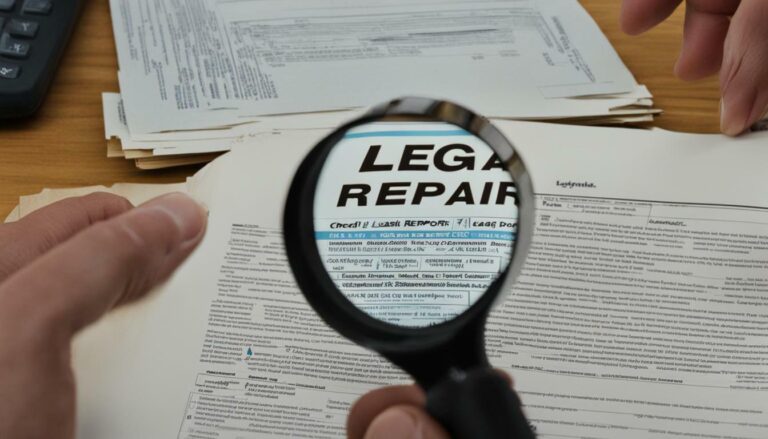Boost Your Finance: How to Improve Credit Score Fast | Tips & Tricks

Having a good credit score is essential for financial stability. If you’re looking to boost your credit score quickly, follow these tips and tricks.
Key Takeaways:
- Paying credit card balances strategically and keeping credit utilization low can improve your credit score.
- Asking for higher credit limits can further reduce utilization and enhance your creditworthiness.
- Becoming an authorized user on a credit card with a good payment history and paying bills on time are effective credit repair techniques.
- Disputing errors on your credit report and handling collections accounts promptly can help boost your credit score.
- Using a secured credit card to build credit and getting credit for rent and utility payments are additional strategies to increase your credit score.
Understanding Credit Scores and How They’re Calculated
Before diving into strategies to improve your credit score, it’s important to understand how credit scores work and what determines a good score. Your credit score is a three-digit number that lenders use to evaluate your creditworthiness and determine the likelihood that you will repay your debts. A higher credit score indicates a lower risk to lenders, making it easier for you to qualify for loans and credit cards with favorable terms.
The most commonly used credit scoring models, such as FICO and VantageScore, calculate your credit score based on several factors. The most important factors include:
- Payment history: Paying your bills on time is crucial to maintaining a good credit score. Late payments, collections accounts, and bankruptcies can have a significant negative impact on your score.
- Credit utilization: This is the percentage of your available credit that you are currently using. Keeping your credit card balances low compared to your credit limits can help improve your score.
- Length of credit history: The longer you have established credit, the better it is for your score. This factor takes into account the age of your oldest account, the average age of all your accounts, and the age of your newest account.
- Credit mix: Having a mix of different types of credit, such as credit cards, auto loans, and mortgages, can positively impact your score. However, it’s important to manage all types of credit responsibly.
- New credit inquiries: Applying for new credit can temporarily lower your score. Multiple inquiries within a short period of time can be seen as a red flag to lenders, so it’s important to be cautious when seeking new credit.
The Factors that Influence Credit Scores
Each credit scoring model may weigh these factors differently, but understanding them can help you identify areas for improvement. By focusing on the factors that have the most impact on your score, you can strategically work towards boosting your creditworthiness and improving your credit score.
Remember, improving your credit score takes time and patience. It’s important to consistently practice good credit habits, such as paying your bills on time, keeping your credit card balances low, and avoiding excessive new credit inquiries. Regularly monitoring your credit reports for errors and taking steps to correct them can also help improve your score over time. By understanding how credit scores are calculated and implementing smart strategies, you can take control of your financial future and achieve a higher credit score.
🚨 TUIC Errors + Low Credit Score?
CreditScoreIQ helps you build credit faster by reporting utility bills to all 3 bureaus—while you dispute errors.
Start Building Credit Today →Paying Credit Card Balances and Increasing Credit Limits
One of the most effective ways to improve your credit score is by paying off credit card balances strategically and keeping your credit utilization low. Maintaining a low credit utilization ratio shows lenders that you are responsible with your credit and can help boost your creditworthiness. To achieve this, prioritize paying down your credit card balances, starting with the ones with the highest interest rates or the highest utilization.
Additionally, you can consider asking your credit card issuer for a higher credit limit. By increasing your available credit, you can further reduce your credit utilization ratio. However, it’s important to use this increased limit responsibly and avoid accumulating more debt. Remember that while a higher credit limit can be beneficial, it’s crucial to manage your spending and keep your balances low.
| Benefits of Paying Credit Card Balances Strategically: | Benefits of Increasing Credit Limits: |
|---|---|
|
|
Paying Down Credit Card Balances:
To pay off credit card balances strategically, consider using the snowball or avalanche method. With the snowball method, you prioritize paying off the smallest balances first, while with the avalanche method, you focus on the debts with the highest interest rates. Whichever method you choose, make sure to pay more than the minimum payment each month to make a significant impact on your balances.
Quote: “Paying off your credit card balances strategically not only has a positive impact on your credit score but also puts you on the path towards financial freedom.” – Financial Advisor
Moreover, avoid closing unused credit card accounts as it can lower your available credit and potentially increase your credit utilization ratio. It’s important to maintain a diverse credit mix by having a combination of credit cards and other types of loans like a mortgage or auto loan, as this can positively impact your credit score in the long run.
By paying off credit card balances strategically and keeping your credit utilization low, you can take significant steps towards improving your creditworthiness and increasing your credit score fast.
Table: Benefits of Paying Credit Card Balances Strategically and Increasing Credit Limits
| Paying Credit Card Balances Strategically | Increasing Credit Limits |
|---|---|
|
|
Becoming an Authorized User and Paying Bills on Time
Boost your creditworthiness by becoming an authorized user on a credit card with a good payment history, and make sure to consistently pay your bills on time. These two strategies can have a significant impact on improving your credit score.
When you become an authorized user on someone else’s credit card, their positive payment history is reflected on your credit report. This can help establish a positive credit history and boost your creditworthiness. However, it’s important to choose someone who has a good payment history and practices responsible credit management.
| Benefits of becoming an authorized user: | Things to keep in mind: |
|---|---|
|
|
In addition to becoming an authorized user, paying your bills on time is crucial for maintaining a positive payment record. Late or missed payments can have a significant negative impact on your credit score. Set up payment reminders or automate your payments to ensure you never miss a due date.
Quotes:
“Becoming an authorized user on a credit card with a good payment history is like borrowing someone’s good credit habits to improve your own.” – Credit Expert
Improving your creditworthiness takes time and effort, but becoming an authorized user on a credit card with a good payment history and consistently paying your bills on time are effective strategies to boost your credit score. Remember to choose wisely and practice responsible credit behavior to achieve long-term credit success.
Dealing with Errors on Your Credit Report and Collections Accounts
Don’t let errors on your credit report or collections accounts hold you back. Learn how to dispute errors and deal with collections accounts to improve your credit score. Taking the time to address these issues can have a significant impact on your overall creditworthiness.
When it comes to errors on your credit report, the first step is to obtain a copy of your report from each of the three major credit bureaus – Experian, Equifax, and TransUnion. Carefully review each report to identify any inaccuracies, such as incorrect personal information, accounts that don’t belong to you, or late payments that were actually made on time.
To dispute these errors, you can file a dispute directly with the credit bureau or through the creditor reporting the information. Provide any supporting documentation that proves the error and clearly explain why it should be corrected. The credit bureau or creditor must investigate your claim and either correct the error or provide a valid explanation for why it was not changed.
| Dispute Process | Contact Information |
|---|---|
| Experian Dispute | Website: www.experian.com |
| Equifax Dispute | Website: www.equifax.com |
| TransUnion Dispute | Website: www.transunion.com |
When dealing with collections accounts, it’s important to know your rights under the Fair Debt Collection Practices Act (FDCPA). If you believe a collections account is inaccurate or you’re unsure about its validity, you have the right to request validation of the debt from the collection agency. They must provide you with proof that the debt is legitimate and that they have the right to collect it.
If you find that a collections account is valid and you’re able to pay it off, it’s generally beneficial to do so. Paying off collections accounts can improve your creditworthiness over time. However, if you believe the collections account is incorrect or you’re unable to pay it off, you may want to consider disputing it. The dispute process for collections accounts is similar to disputing errors on your credit report.
Building Credit with Secured Credit Cards and Rent/Utility Payments
Building credit can be done through secured credit cards and by getting credit for your rent and utility payments. Discover how these methods can help improve your credit score.
Secured credit cards are a great tool for building or rebuilding credit. These cards require a security deposit, which becomes your credit limit. By making on-time payments and keeping your utilization low, you can demonstrate responsible credit behavior and boost your creditworthiness. It’s important to choose a secured credit card that reports to all three major credit bureaus, as this will ensure that your positive payment history is reflected in your credit report.
Another way to enhance your credit score is by getting credit for your rent and utility payments. Many property management companies and utility providers now report your payment history to credit bureaus. By consistently paying these bills on time, you can strengthen your credit profile. It’s advisable to ask your landlord or utility company if they report to credit bureaus, and if they don’t, you can consider using services like RentTrack or Experian Boost to have your payment history included in your credit report.
In summary, building credit takes time and effort, but with the right strategies, you can see improvement. Secured credit cards and credit for rent and utility payments are two effective methods to boost your credit score. By practicing responsible credit behavior and being patient, you can gradually improve creditworthiness and open up better financial opportunities in the future.
| Key Points |
|---|
| Secured credit cards require a security deposit and can help establish or rebuild credit. |
| Choose a secured credit card that reports to all three major credit bureaus. |
| Getting credit for rent and utility payments can be done by checking with your landlord or utility company if they report to credit bureaus, or by using services like RentTrack or Experian Boost. |
| Consistently paying bills on time is key to improving your credit profile. |
Practicing Positive Credit Behavior and Other Tips
In addition to the strategies mentioned earlier, there are several other tips and tricks that can help you improve your credit score quickly. Explore these ways to boost your creditworthiness.
1. Set up payment reminders: Missing payment deadlines can have a negative impact on your credit score. To avoid this, set up payment reminders through your bank’s online banking system or use mobile apps that send notifications when bills are due. This will help you stay on track and ensure that payments are made on time.
2. Pay down maxed out cards first: If you have credit cards that are close to their credit limits, prioritizing paying them down can have a significant positive impact on your credit score. Start by paying off the cards with the highest balances, as this will help improve your credit utilization ratio and demonstrate responsible credit management.
3. Diversify your accounts:
| Type of Account | Benefits |
|---|---|
| Credit Cards | Holding different types of credit cards, such as those with rewards or cashback programs, can show lenders that you can manage different types of credit responsibly. |
| Installment Loans | Having a mix of installment loans, such as a car loan or a mortgage, can demonstrate your ability to handle different types of debt. |
| Revolving Accounts | Having a mix of revolving accounts, such as credit cards, can show lenders that you can manage credit over an extended period. |
4. Check your credit report regularly: It’s important to review your credit report regularly for errors or discrepancies. Incorrect information can negatively impact your credit score. If you find any errors, dispute them with the credit reporting agencies to have them corrected. You are entitled to a free credit report from each of the three major credit bureaus (Experian, TransUnion, and Equifax) once a year.
Remember, improving your credit score takes time and patience. Be diligent in your efforts and follow these tips consistently. By practicing positive credit behavior, diversifying your accounts, and staying proactive in managing your credit, you can gradually improve your creditworthiness and achieve a better credit score.
Checking Your Credit Report Regularly and Conclusion
It’s crucial to monitor your credit report regularly for errors and changes. By following the tips and tricks mentioned in this article, you can improve your credit score fast and secure a brighter financial future.
One of the most important steps in improving your credit score is understanding how credit scores are calculated. By familiarizing yourself with the factors that contribute to a good credit score, you can tailor your financial habits to meet those criteria.
Additionally, paying credit card balances strategically and keeping your credit utilization low can have a significant impact on your credit score. Asking for higher credit limits can further reduce your utilization and improve your creditworthiness.
Furthermore, becoming an authorized user on a credit card with a good payment history and consistently paying bills on time are essential for maintaining a positive payment record. Disputing errors on your credit report and handling collections accounts promptly can also help boost your credit score.
Building credit with secured credit cards and seeking credit for rent and utility payments are effective strategies for improving your creditworthiness. Practicing positive credit behavior, such as setting up payment reminders and paying down maxed out cards first, can also contribute to a faster credit score improvement.
Remember to regularly check your credit reports for errors and review them for any discrepancies. By staying diligent and patient, you can gradually rebuild your credit over time. With consistent effort and a focus on responsible financial habits, you can successfully improve your credit score and pave the way for a brighter financial future.
FAQ
How can I quickly improve my credit score?
There are several strategies you can use to improve your credit score quickly. These include paying credit card balances strategically by keeping credit utilization low, asking for higher credit limits to reduce utilization even further, becoming an authorized user on a credit card with a good payment history, paying bills on time to maintain a positive payment record, disputing errors on your credit report, dealing with collections accounts by paying them off or disputing them, using a secured credit card to build credit, getting credit for rent and utility payments, and practicing positive credit behavior. It’s important to understand how credit scores are calculated, to pull your credit reports and review them for errors, and to be patient and diligent in your efforts.
How long does it take to rebuild credit?
The time it takes to rebuild credit varies depending on the individual and the specific circumstances. It can take several months or even years to see significant improvements in your credit score. It’s important to be patient and continue practicing good credit habits over time. Regularly checking your credit score and credit reports can help you track your progress.
What are some tips for improving credit score?
In addition to the strategies mentioned earlier, here are some other tips for improving your credit score: set up payment reminders to ensure you never miss a payment, consider paying more than once in a billing cycle to reduce your credit utilization, contact your creditors if you’re unable to meet payment deadlines, apply for new credit sparingly, avoid closing unused credit card accounts, be cautious when paying off old debts, prioritize paying down maxed out cards first, diversify your accounts by having a mix of different types of credit, and regularly check your credit report for errors.
Source Links
- https://www.debt.org/credit/improving-your-score/
- https://www.cnbc.com/select/how-to-boost-your-credit-score-fast/
- https://www.nerdwallet.com/article/finance/raise-credit-score-fast
Ready to Improve Your Credit?
Disputing TUIC errors is step one. Step two? Boost your score by reporting utility payments with CreditScoreIQ.
Get Started Now (Only $1 Trial) →3-bureau reporting • $1M identity insurance • Dark web monitoring



